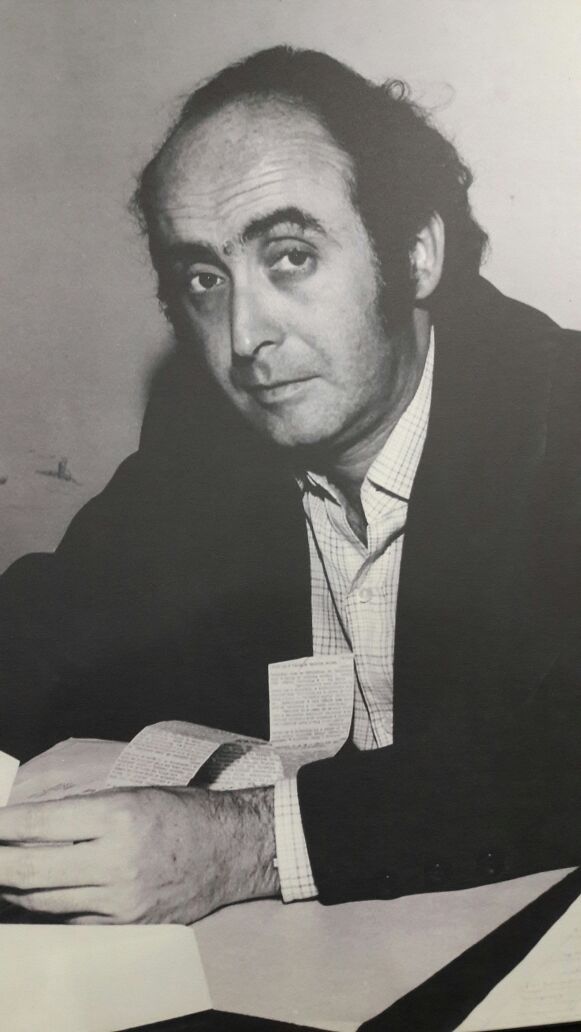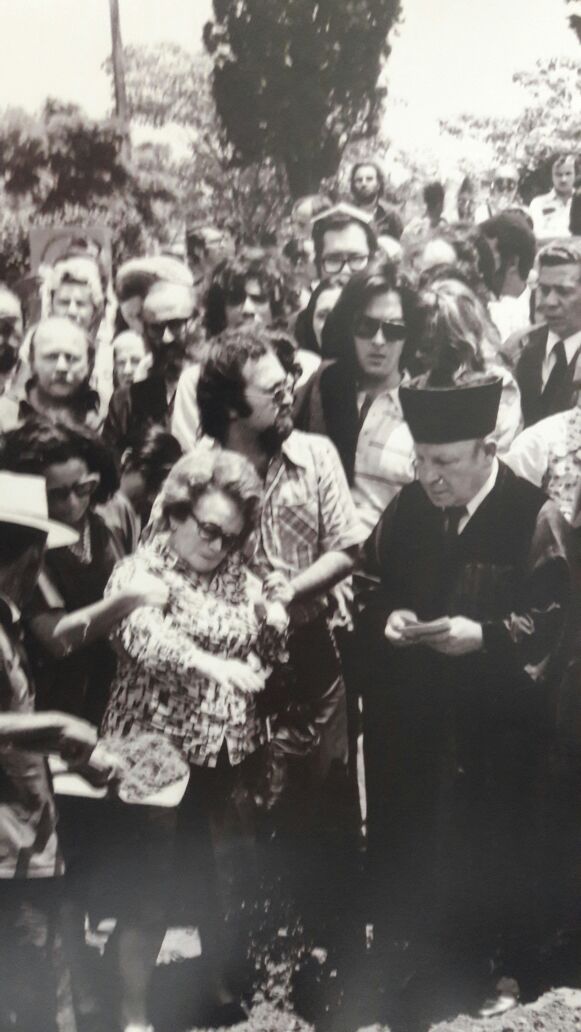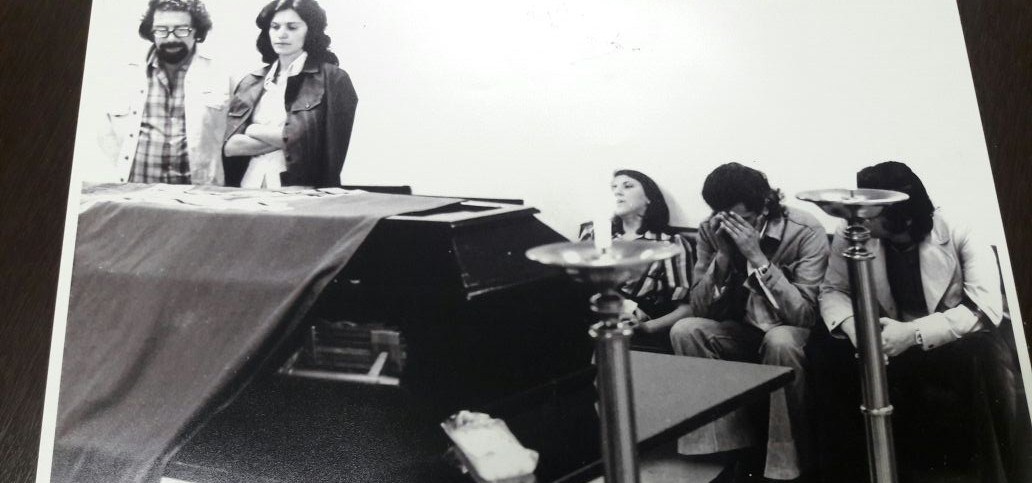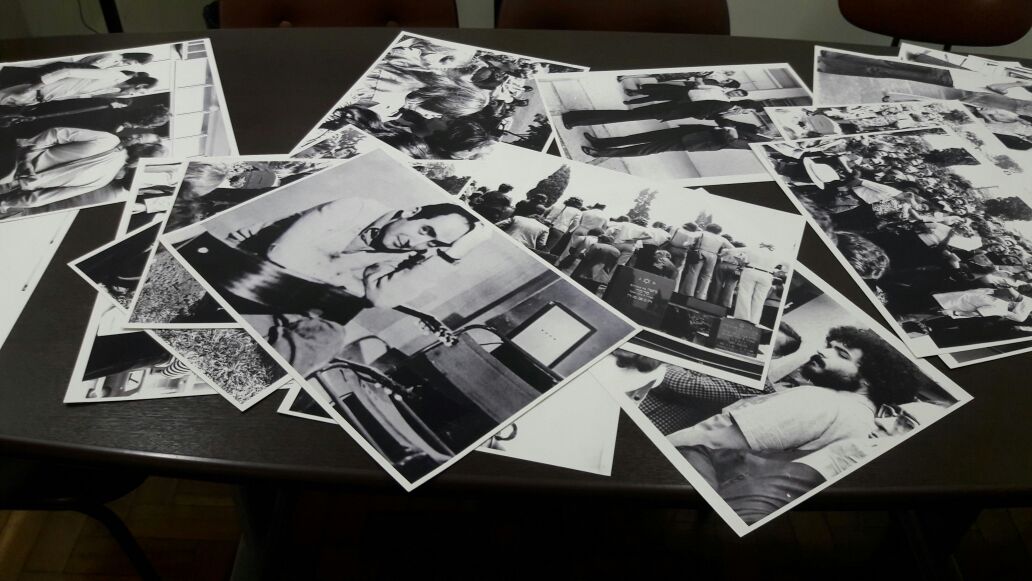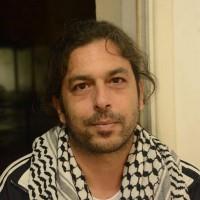يعتبر فلاديمير هيرزوغ رمزاً لإعلاميي البرازيل بعد الحقبة الديكتاتورية السوداء التي استمرت منذ العام 1964 وحتى العام 1985. صدرت العديد من الكتب والمؤلّفات التي تروي سيرة حياة هذا الرجل، مؤرّخة لتلك الفترة. إضافة إلى أن عملية قتله ألهمت العديد من فناني البرازيل وأدبائها الذين تناولوا تلك المأساة بأعمالهم، فقد غنّت له الفنانة الشهيرة إليس ريجينا أغنية "الثمل والديمقراطية".
ولد فلادو هيرزوغ 1937 في يوغسلافيا لكنه غادرها مع عائلته إلى إيطاليا عام 1941 بسبب الاضطهاد الذي كانوا يتعرضون له لاعتناقهم الديانة اليهودية. كان عمره أربعة أعوام فقط حين استقرت العائلة في ساو باولو حيث بدأ يتشكل وعيه هناك.
وفي ذلك الوقت كانت أهم الاختصاصات الجامعية المتاحة في البرازيل الفلسفة والقانون، فاختار دراسة الفلسفة في جامعة ساو باولو، وخلال دراسته تدرَّب في أحد أهم الصحف البرازيلية التي تصدر منذ ذلك الوقت (1958) إلى الآن.، وهي صحيفة استادو (Estadao).
وخلال فترة الدراسة والتدريب، كان هيرزوغ يتردّد مع مجموعة من رفاقه إلى الأرجنتين التي كانت قد بدأت بإنتاج الأفلام السينمائية، فاستهوته السينما وبدأ دراستها هناك إلى أن أصبح رائد عمليات الدبلجة للأفلام السينمائية من كل اللغات إلى اللغة البرتغالية.
لاحقا، نقل تجربته من السينما إلى التلفزيون، وحجّته في ذلك أن "الطبقات البرجوازية هي طبقات متعلمة وليس لديها مشكلة مع اللغات الأخرى، بينما "أكثر من نصف الشعب البرازيلي فقراء أمّيون، بحاجة لنقل تلك الثقافات إليهم".
بعد عام من تدرّبه في استادو، تم قبوله للعمل فيها. غيّر اسمه ليصبح فلادو بدلا من فلاديمير "Vladimir"لا لشيء إلا لغرابة وصعوبة لفظ اسمه فلادو (Vlado) باللغة البرتغالية.
نقطة التحول الكبرى التي لعبت دوراً مهماً في تكوين قناعات هيرزوغ السياسية، كانت لقاؤه بالفيلسوف الفرنسي "جان بول سارتر" الذي زار البرازيل عام 1960، حيث بدأت ميوله اليسارية تظهر بشكل أوضح لينضم فيما بعد إلى "الحزب الشيوعي البرازيلي".
عام 1962، تعرّف إلى "كلاريس" وتزوجها عام 1964 في البرازيل، ليغادرا بعدها للعيش في لندن خوفاً من الحكم الديكتاتوري الذي استلم السلطة في العام ذاته.
بعد وصوله إلى لندن، ولأنه درس السينما، فقد وجد له عملا في الـ "بي بي سي".
بعد فترة من الإقامة في لندن، أصبح أبا لطفلين انتقلا مع والدتهما كلاريس للبرازيل ليلتحق بهم هيرزوغ بعد أن اطمأن إلى أنّه ليس مطلوباً للأجهزة الأمنية.
بعد وصوله إلى البرازيل، عمل أستاذا محاضرا في جامعة "FAAP" الخاصة، وهنا بدأ ببناء شبكة علاقات جديدة، كان يغلب عليها الطابع اليساري بشكل واضح جداً.
عام 1970، كان رئيس الموظفين في تلفزيون "كُلتورا" الحكومي، وكان أغلب العاملين في ذلك التلفزيون من اليساريين المناهضين للحكم الديكتاتوري. وإلى جانب عمله في التلفزيون، بدأ هيرزوغ بتدريس الإعلام في "جامعة ساو باولو" الحكومية. في هذه الفترة، كانت الرقابة على الصحافة في ذروتها، وكانت الأجهزة الأمنية تطالب وسائل الإعلام بتحريف الحقائق وتزويرها تحت طائلة المحاسبة، مما اضطر فريق التلفزيون العامل مع هيرزوغ إلى ابتكار أساليب ترميزية مبتكرة لإيصال الحقيقة إلى الناس، وهو ما أغضب الديكتاتور "إرنستو غايزل" في حينه، حيث اتّخذ القرار بتصفيته.
تحتاج هذه الفتر لسرد سريع لتاريخ الحكم الديكتاتوري في البرازيل والذي كان قد بدأ في العام 1964 وانتهى عام 1985.
عصر الديكتاتورية البرازيلي
عام 1964، أطاح العسكر بالرئيس اليميني الديمقراطي "جوان غولار" الذي كان يطمح للإصلاح الزراعي والتربوي والقضاء على الأمية، وقد كان منحازاً إلى الطبقة العاملة، الأمر الذي لا يرضي البرجوازية البرازيلية والولايات المتحدة، وسمِّيت تلك الفترة بـ"الحرب الباردة".
بعد الإطاحة بغولار، استلم السلطة من بعده "رينييري مازيلي" لمدة أسبوعين بالضبط، من تاريخ 2 أبريل/ نيسان 1964 وحتى 15 أبريل/نيسان من نفس العام. ويمكن القول هنا إن عصر الديكتاتورية العسكرية كان قد بدأ بالفعل. استلم السلطة بعد رينييري مباشرة الماريشال "كاستيلو برانكو"واستمر في السلطة من عام 1964 وحتى 1967 ليستلم من بعده الماريشال "كوستا إي سيلفا"من عام 1967 وحتى 1969، حيث قام بتغيير الدستور الاتحادي للدولة، فأصدر ما يعرف بـ "قانون المؤسسات رقم 5"، واختصاره AI -5""، وقد أضر هذا القانون بالطبقة المثقفة برمتها من شعراء وكتاب وموسيقيين وصحفيين وفنانين.. إلخ.
من هنا، بدأت الفنون تتطور باتجاه استخدام الترميز لتوصيف الواقع، وهو ترميز حذر وذكي وخطر، حيث أن مجرّد فهم السلطات للمادّة الأدبية أو الثقافية المطروحة، سيكلّف صاحبها حياته وحياة عائلته.
استمر الحكم العسكري بعد ذلك مع الجنرال "إميليو غاراستازو ميديسي" الذي سُمّيت فترة حكمه بـ "سنوات الرصاص". استمر ميديسي في السلطة منذ 1969 وحتى 1974، وقد مارس هذا الديكتاتور أبشع أصناف التعذيب بحق المعتقلين في سجونه، وارتفعت حدّة الإغتيالات. في عهد هذا الجنرال، تم إقرار قانون منع التظاهر لأول مرة في تاريخ البرازيل، فيما تم تحييد القضاء، وإعطاء الصلاحيات الكاملة للجيش بالتعامل مع أي احتجاج، أي أنّه أعلن "حالة الطوارئ".
بدأ ميديسي بالتضييق على الحياة العامّة، وبدأت الحريات بالانحسار، إضافة إلى أن ذلك أتاح المجال لأجهزة المخابرات التعامل مع الصحفيين الذين يغرّدون خارج السرب.
حكم من بعده الجنرال غايزل الذي استلم السلطة منذ العام 1974 وحتى 1979، كان هذا الجنرال أميناً على نهج سلفه، حيث لم يغير شيئاً، بل استمر بذات الطريقة الدموية في السلطة، في ما كانت أصوات الاحتجاج تعلو شيئاً فشيئاً. في فترة حكم غايزل، اغتيل فلاديمير هيرزوغ.
خلف غايزل الجنرال "جواو فيغيريدو"، الذي حكم منذ العام 1979 وحتى 1985. مثّل حكم هذا الديكتاتور نهاية فترة سوداء في تاريخ البرازيل الحديث، حيث بدأ النظام الأمني بالتهاوي حين عمّت المظاهرات مختلف الولايات في تحد واضح لهذا النظام رافعة شعارها الأبرز "الشعب يريد رئيساً منتخباً". مثّل هذا ذروة الصراع، عندما بدأت بعض القطاعات الرأسمالية المتحالفة مع القطاعات المتضرّرة بالجيش، تنفيذ بعض العمليات الإرهابية التي كان يتم إلصاقها بمجموعات مجهولة، بل ربّما تكون غير موجودة، في محاولة لإعادة تجديد النظام الديكتاتوري وإحيائه بعد أن شارف على لفظ أنفاسه، مع العمل على توظيف الإعلام وتجييره لخدمة هذا الهدف. كان هذا يدفع الناس الذين يعرفون حقيقة ما يحدث، للاحتشاد أكثر في الشارع، وهو ما أجبر فيغيريدو على السماح لبعض الصحف اليسارية بالصدور شيئاً فشيئاً، وبداية كف يد الأجهزة الأمنية عن أعناق الشعب.
في العام 1985، أجريت أول انتخابات داخل البرلمان لانتخاب رئيس، نجح فيها مرشح "الحركة الديموقراطية البرازيلية" تنكريدو نيفيس (Tancredo neves) لكن المنية عاجلته قبل استلامه السلطة ليخلفه نائبه جوزيه سارنيه (jose sarney)، في أول نظام منتخب من قبل البرلمان بعد نهاية الحكم العسكري، لتطوى هذه الصفحة السوداء من تاريخ البرازيل.
مواجهة الديكتاتور
إذاً، وبسبب الطريقة التي كان يعمل بها تلفزيون كلتورا الحكومي تحت إشراف هيرزوغ، قامت وحدة من أجهزة المخابرات DOI-CODI باقتحام المحطة بحثاً عنه بحجة أنه عضو في "الحزب الشيوعي البرازيلي" المحظور، ولم يكن حينها في المحطة فنصحه رفاقه في العمل أن يتوارى عن الأنظار، لكن هيرزوغ رفض الاختباء واختار المواجهة، فذهب إلى إدارة المخابرات لمراجعتهم حيث تم اعتقاله، ليتعرّض -بحسب الكثير من المعتقلين الذين كانوا في الزنازين المجاورة- لتعذيب وحشي أودى بحياته خلال ساعتين فقط.
حاولت المخابرات تصوير موته على أنه انتحار، حيث قامت في اليوم التالي لقتله بتوزيع صورة مفبركة له بعد أن عمّمت خبر انتحاره شنقاً، إلا أن الصورة لم تكن احترافية، لأنّها تظهره معلّقاً بشباك نافذة أقصر من قامته، بينما قدماه على الأرض، وهو ما لفت انتباه الحاخام الذي أشرف على عملية دفنه، حيث لا يدفن اليهودي المنتحر في مدافن اليهود، إلا أن الحاخام إنري سوبيل (Henry Sobel) وبعد معاينته للجثة، قرّر -وخلافاً لتعليمات أجهزة المخابرات- أن يدفنه في مقابر اليهود على اعتبار أنّه تعرّض للقتل تحت التعذيب ولم ينتحر. بعد ستة أيام على دفنه، أقيمت الصلاة على روحه في كنيسة "سي" وسط ساو باولو، وقد حضر الصلاة رجال دين كاثوليك وبروتستانت ويهود، لتتحول هذه الدعوة للصلاة لمظاهرة عارمة غير مسبوقة منذ أن أقر القانون السيء الصيت "AI – 5" في العام 1968، كانت هذه المظاهرة بداية كسر حاجز الصمت، وبداية مرحلة المظاهرات الضخمة، التي أدّت في النهاية إلى إنهاء الحكم الديكتاتوري.
لحظة مفصلية
بعد سقوط آخر ديكتاتور عام 1985، نُشرت عدّة أعمال تتحدّث عن فلاديمير هيرزوغ وكان آخرها هذا العام، حيث نشرت الصحفية البرازيلية "مارسيا كامارغوس" كتابا بعنوان "صبي يُدعى فلادو".. وعن الجديد الذي سيضيفه هذا الكتاب، تقول مارسيا "كتب الكثير من المؤرّخين وأصدقاء فلادو عنه، لكن أحداً لم يخاطب الجيل الجديد، الأجيال الشابة التي لا تعرف أي شيء عن فترة الحكم الديكتاتوري" مستطردة "أهمية فلادو، أن قتله كان اللحظة المفصلية لبداية نهاية تلك الفترة المظلمة من تاريخ البرازيل".
أسست زوجته كلاريس هيرزوغ معهداً يحمل اسم زوجها، وما زالت تناضل وتترافع أمام المحاكم للحصول على اعتراف من أجهزة المخابرات بقتلهم فلادو، وقد استطاعت في العام 2013 -بعد وصول اليسارية ديلما روسيف إلى رئاسة الجمهورية- انتزاع اعتراف حكومي يقول إن فلادو قتل بسبب التعذيب وسوء المحاكمة، إلا أن أحداً لم يُحاسب على تلك الجريمة، وهو ما يدعو للخوف من المستقبل، إذ بحسب مارسيا كامارغوس "هنالك تنظيمات يمينية متطرّفة، ما زالت إلى اليوم تدعو لعودة النظام الديكتاتوري إلى السلطة".
فلاديمير هيرزوغ اليوم هو واحد من أبرز رموز الصحافة الحرة في البرازيل، إذ أن سيرته تؤرّخ لمرحلة كاملة عانت البرازيل فيها ودفعت الكثير من الأرواح للتخلّص منها ولفتح صفحة جديدة يتم التداول فيها على السلطة بشكل سلمي.
كما يمكن القول إن الإعلام البرازيلي استطاع التخلّص من سطوة الرقابة المخابراتية، ليقع في المرحلة الجديدة تحت سطوة الخصخصة ورأس المال الخاص الذي تتحكّم فيه بضع عائلات ثرية ومتنفّذة، وهي على ارتباط وثيق بالسلطة وبكل أجهزتها القمعية رغم وصول "اليسار" ممثلاً بلولا دا سيلفا إلى السلطة منذ العام 2002 لفترتين رئاسيتين، وحتى وصول رفيقته ديلما روسيف إلى رئاسة الجمهورية من بعده، ثم إقصائها من منصبها.
